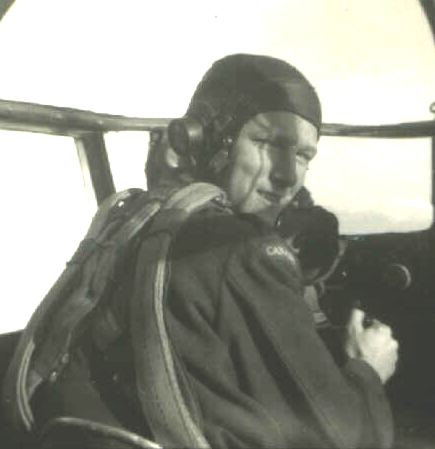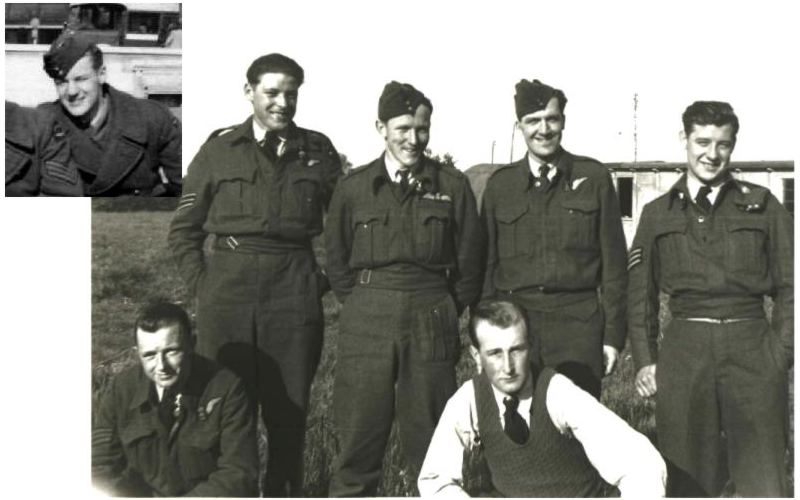Flight Lieutenant Alex Campbell shares some stories from Freteval
Forest.

Flight Lieutenant Alex Campbell shares some stories from Freteval
Forest.

New: Conversations with E.A. Campbell (mp3 audio)
Southwest of Chateaudun in France lies a forest with a special interest to a rather unique group of people. It is the place where some one hundred and fifty Allied airmen were successfully hidden from enemy hands in world war two. In the following paragraphs I shall tell the part of the story that relates to myself and members of my crew.
A few seconds to midnight on July 28th 1944 a Lancaster MkII was attacked and shot down near Chateaudun in Occupied France. Two hours earlier the bomber and it's crew had taken off on their 25th Op (Operation). They were nearing the total number of Ops required to qualify them for a "tour". This would mean at least a 30 day leave including a trip "home" followed by a posting to a different trade or calling.
We belonged to RAF Squadron 514 Waterbeach, Cambs. England. Our Lanc. "A2 C" was manned by the following crew -

Crew of Lancaster "A2 C"
Inset Image: MUG F/S E.R. Jones RCAF
Back Row: F/E F/S W.A. Donaldson RAF
, Pilot- F/L E.A. Campbell RCAF, B/A
F/O J. E. Chapman RCAF, W/Op F/S B. Lyons RAF
Front Row: RG F/S S.A. Harvey RCAF,
Nav F/S E.R.Garland RCAF
No photo available for F/O Bob Giffin who took part in the flight as second dickie. Bob died from injuries sustained during the attack.
Events leading up to our sojourn in Freteval are detailed in earlier print.
Map of area around Freteval Forest
I shall pick up the story as we enter the welcome shelter of the forest. After a drink of ice cold spring water we began our introductions and a brief tour of the "camp". A most important list of "do's and don'ts"
was given to us by various members of the group. Reference to items on this list will appear off and on in the following narrative.
We were told of another camp some 8 km further on designated "B" camp, ours being "A". It held a similar number of airmen in the same position as ourselves. In another week or so the combined camps would total one hundred and fifty members. This was a cumbersome lot for our protectors to look after and we had to be constantly reminded of the ever present dangers.
Food was an obvious necessity and the preparation and search for it was always interesting and sometimes bizarre. In this area lived a number of known and trusted "safe" helpers who were, for the most part, farmers. On a hot afternoon in early August a stranger was escorted into our midst by one of our "lookouts". He was carrying a burlap sack which appeared to be heavily loaded as, with a look of relief, he lowered it to the ground. Being on food detail that day I was one of several persons present at the time. The sack had dark red stains showing through from the inside. As the sack was opened a cluster of flies emerged circling and buzzing about. Peering inside we saw a number of dead rabbits in a variety of colours, shapes and sizes, seven in all. I suspect they were somebody's pets and had all met the same sacrifice . In a rather fortunate turn one of our number was rumored to be an experienced cook. As it turned out he may not have been too experienced in food preparation, especially with dead rabbits. However, we all enjoyed a taste of rabbit stew that evening along with a surprise helping of peas. Now this fed some sixty young, forever hungry fliers who seldom complained- it was unwise to do so.
Our main diet consisted of apples, green apples. 1944 must have been a good year. They could be eaten in quite a number of ways and usually with the same effect especially when raw. We did have some rather pleasant diversions often brought in by our benefactors. One interesting thing was the making of erzatz coffee. Being harvest time barley was becoming available in quantity. By rubbing it between your hands you could remove most of the chaff and by blowing on it you would be left with a few precious grains of barley.
A source of heat was needed for our cooking and other such operations. From a recently abandoned dump a suitably sized chunk of steel plate was acquired. Resting on a few stone supports it provided an ideal cooking surface. The barley was spread out on the center of the plate and carefully watched till it showed signs of being properly roasted. It was then brushed to the outer edges to be replaced by a fresh batch of barley. Using clear spring water the freshly roasted grounds were brought to a boil in a tin can. Smaller tins and other makeshift containers were used as cups from which to sip the tasty coffee.
We usually had a sweetener of some sort whether saccharin or real sugar it made a welcome treat. Fresh milk was not available and I'm not sure what served as a substitute. I can recall some type of powder or tablet that further enhanced our coffee break.
Most evenings we would be summoned down to the meeting place for a brief gathering round a very subdued and smokeless fire. We were often handed a piece of heavy, unsweetened dark rye bread. We could take turns beside the bed of hot coals and make toast. If there was no coffee that night we could always drink spring water. Another luxury was the delicious smell of hot chocolate. This was made by melting lumps of hard Baker's chocolate in hot water. While enjoying our bed time treat we could listen to the BBC news and often the Vichy version as well. On comparing the two reports we could come up with a fairly accurate picture of the progress of the approaching Allied Forces.
We had several "lookout" posts from which we could watch for any unwelcome intruders. This was done in pairs which enabled one person to run back to camp if necessary. I recall one incident that turned out to be harmless when a young couple wandered part way into the forest and left none the wiser.
Nearing mid August one evening I was posted to lookout
duty along with another camper. Twilight was approaching when we became
aware of a strange commotion approaching from the southwest. Finally into
view came a confusion of men and vehicles in obvious haste. They were heading
in an easterly direction and left no doubt they were survivors of an army
in desperate retreat.
As we watched fascinated, from the top of an embankment, a different and more ominous sound came to us through the turmoil. As it quickly approached we soon recognized it as the sound of a heavy calibre rapid-fire weapon. It turned out to be a Martin Marauder blazing away at the retreating
stream adding to the plight of the fleeing men and disabled vehicles. The Marauder abruptly stopped firing and with a climbing turn to starboard disappeared from our view. As darkness approached we made our way back to camp with our report of these exciting events.
Some of the more obvious rules of our camp excluded carrying firearms, or building unauthorized fires, planning escapes, any sport liable to result in loud noises (such as cheering), the consuming of alcohol to name but a few. I saw no opposition to these or any other rules that became necessary as events and circumstances changed.
Our camp was no exception to the endless stream of rumors that abounded throughout the rank and file of the military. Our excitement mounted daily and was spurred on with the arrival of new evaders and "Special" visitors. For example a "helper" escorted into our camp a young man whose face was swathed in what appeared to be curtain cloth. As we became more closely acquainted in the next few hours it was soon obvious he urgently needed medical attention. The colour and foul odour of the flesh verified the need for action. Somehow arrangements were made and with the ever present risk of discovery the unnamed helpers managed to get the necessary medical help. What a nice surprise to see Sgt. Sam Dunseith at a reunion in Cleveland a year or so later. " -cigarettes, wild boar, vipers, supply drop, "Cousin Lucien", wasps, silk sheets, a movie actress & son, Belgian spy, girl spy and Airey Neave, and book-" These references I shall dwell on further along.
Cigarettes, for example, were among the many items in great demand but in short supply. A girl appeared in our camp one day and as rumors flourished quite a number of us gathered at the meeting place. She was in conversation with a small group of men, two of which were known to us. We learned that the third man was a Belgian and noticed that the girl spoke fluently with him and also with our two acquaintances although in different languages. Being unable to understand the conversation, let alone join in, we occupied our time discussing by what means we might be able to entertain this young lady. At one point she discarded a partly used cigarette and stepped on it. Quite shamelessly a number of us made an attempt to salvage the prize. On seeing our reaction she turned to us and said in clear, concise English "I have extra cigarettes, would you boys like some?" Our minds immediately recalled our recent comments about this young lady but, nonetheless, we graciously accepted her offer.
In my youth I saw a film depicting wild boar. My mind showed these creatures as ferocious animals possibly a threat to the "Bengal Lancers".
One morning on a cautious sojourn through "our" forest we came upon the body of a dead pig. It turned out to be a wild boar with curled tusks protruding from it's snout. It had a ridge of coarse bristles running from head to tail along it's back. Even in death it caused a stir of respect and concern as I recalled the images of those giants of bygone years. We found another such creature a short distance away. This one had but a single tusk intact, the other being broken in a jagged stub. Neither of these specimens would come close to a 200 lb. market size hog.
Wasps were everywhere. We knew quite well what they were as they seemed to be part of life back in England. As I have mentioned we had a substantial supply of apples. We learned how to eat them in a wary fashion. A wasp could zoom in at the last split second as you tried to ram in a spoonful full of apple sauce. If you were lucky you could just spit it out before being stung. Snakes also appeared on the scene. I believe they were called vipers but I can't recall what they looked like. They must have been harmless as I don't remember hearing of anyone being bitten by them.
To be continued ..............